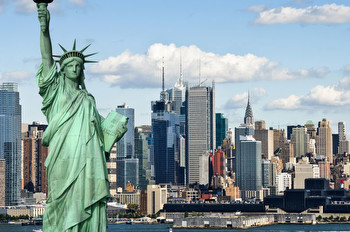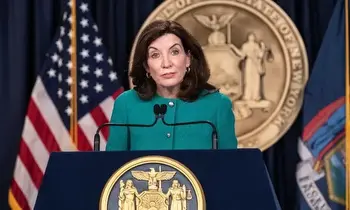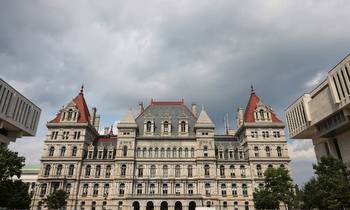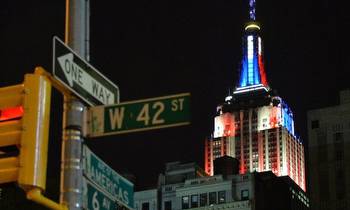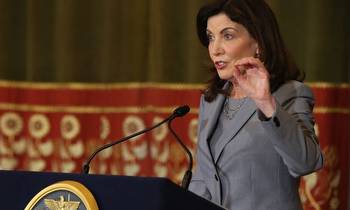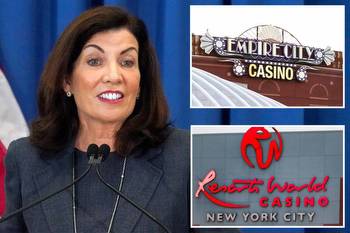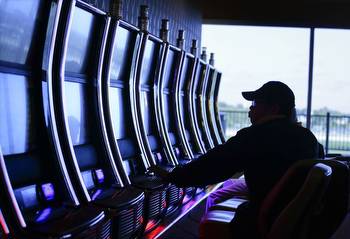Gambling Expansion Momentum Has Slowed To A Halt In New York

An effort to legalize online casino games in New York died this week when legislators from both the House and Senate omitted it from their budget proposals. In the final days of negotiations, even the man who wrote the bill could see it was gaining little traction.
The licensing of three new casino projects in or around New York City has slowed considerably, to the apparent frustration of some of the operators and developers looking to start building anytime soon. And plans to expand the number of sports betting operators and to increase the menu available to sports bettors thus far have gone nowhere.
When the ball dropped at Times Square to usher in 2023, many gambling entities and their political allies seemed hopeful that the year would see continued expansion and fine tuning to keep New York’s gambling industry competitive with neighboring states and to open up robust new tax streams. Instead, such hopes have all but been dashed.
Shifting political winds
It certainly appears as if the political climate for gambling expansion has gone from bright and sunny to dark and cloudy in a short period of time. As he was trying to build support to get iCasino in the one-house budget, Sen. Joe Addabbo, one of the architects of New York’s sports betting industry, signaled some frustration. He appears to be one of the few political leaders championing gambling expansion these days.
“I’m not going to be the only one talking about this,” Addabbo told US Bets. “I offered everyone at our [iCasino] roundtable an opportunity to talk to the governor, talk to my Senate leader. Let’s start talking about this. Why wait? If they don’t want it, fine.”
The staunchest resistance to iCasino seems to have come from the Hotel and Gaming Trades Council, the union for hotel and casino workers in the Empire State. The consortium clearly was worried about job losses at the state’s casinos, racinos, and video-lottery parlors if the state’s residents could simply place bets from the palms of their hands.
But Addabbo said he is convinced from the studies he has been presented, produced by Spectrum Gaming and other independent agencies, that iCasino wouldn’t, in fact, cannibalize the business of brick-and-mortar gambling establishments.
“Both iGaming and retail are increasing in states that have iGaming. There is no cannibalization,” he said.
Casino process inches along
Addabbo also didn’t think adding iCasino would slow the process for awarding three new licenses for downstate casinos. That process seems to have hit the brakes all on its own and is now moving at a snail-like pace.
In its latest update, New York’s gaming commission said the powerful Gaming Facility Location Board (GFLB) received “several hundred” questions from interested parties during Round 1 of the Request for Applications. The board’s staff is reviewing those questions for duplicate submission, then drafting responses. That process alone is expected to take weeks. Once those responses come, bidders will have another month to submit another round of questions.
The GFLB itself still isn’t even fully formed, with just three of five members seated. In her draft budget proposal, Gov. Kathy Hochul didn’t anticipate revenue from the downstate casinos to come pouring in until 2026, far later than Addabbo and others originally anticipated. Until then, Hochul had been viewed as a fairly reliable ally of Addabbo’s and other legislators looking to expand gambling’s footprint in the state.
What’s behind the change in the political waters when it comes to gambling? It could just be a natural reaction to the rapid changes sports betting has brought, most noticeably through operators’ aggressive marketing tactics at launch. One New York bill would require warnings on all gambling advertisements and the gaming commission itself approved far stricter advertising rules. For now, those discussions have overtaken talk of the $750 million in new taxes that sports betting has netted the state in the past 13 months.
Negative coverage of the gambling industry appears to be part of the political sea change. In November, The New York Times ran a series of articles that showed how the gambling industry influences politicians. Earlier this week, Politico published an article calling New York casino contracts an “absolute petri dish for corruption,” and reported that lobbying firms had made $7.2 million representing 10 casino proposals on behalf of those operators.
New York leaders will have to wait another nine months to restart talks of adding iCasino or otherwise expanding gambling’s reach in the state. That means revenue from those activities likely won’t come pouring in until 2025 or later. At the moment, the political price appears to be too high to champion the benefits gambling expansion might bring.








